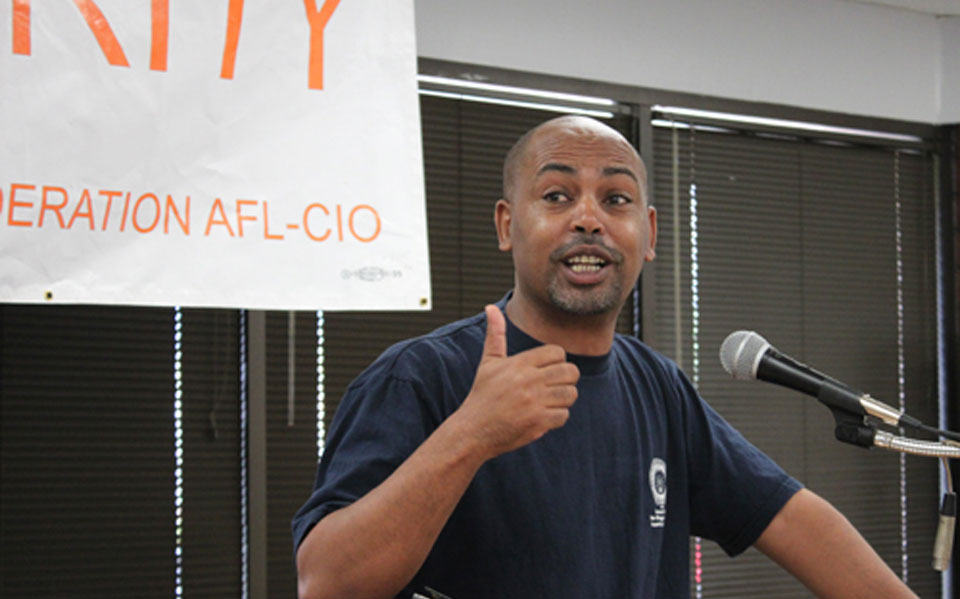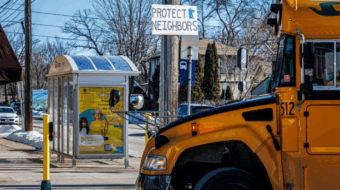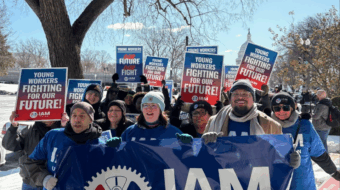
Saying “systematic racism is alive and well in 2020,” AFL-CIO Executive Vice President Tefere Gebre challenged union members and the Democratic Party as a whole to confront it and campaign hard for comprehensive solutions to the nation’s longest-lasting and most-corrosive chasm.
And increasing unionization is one big part of that solution, he declared.
Gebre delivered his challenge to the Democratic National Convention’s Labor Council, meeting “virtually” rather than in Milwaukee before the convention itself opened on August 17. Like the panel meeting, the convention is being held by zoom and at long distances due to restrictions needed to battle the coronavirus pandemic.
It’s that pandemic that has blown systemic racism wide open for all to see, Gebre said. And we can’t avoid it, as the U.S. has done for most of the 401 years since the first enslaved African Blacks were offloaded from ships at Jamestown, Va., in 1619.
That’s because the pandemic has taken an outsized toll on people of color, he explained. “African-Americans and Latinos are being infected and dying at a higher rate” than whites. And as the nation tries to crawl out of an economic depression, “whites are getting back to work a lot faster than any other group.”
Coronavirus data back him up. The APM research lab, using Census data running through August 4, reports the coronavirus death rate among Blacks was 80.4 dead per 100,000 people. It was 45.8 per 100,000 Latinos and 35.9 per 100,000 whites.
Systemic U.S. racism, however, goes far beyond numbers, Gebre, originally a Black political refugee from war-torn Ethiopia, told the group. It extends to education, housing, mass transit, worker rights, and—since he spoke at a Democratic convention event—politics.
“How else can we explain the last four years from hell?” he asked.
“The nation is creeping towards authoritarianism, with Nazis marching in the streets, encouraged by the president,” Gebre added, without naming that Oval Office denizen.
But “this is not new,” said Gebre. “Racism and inequality have been part of the American fabric.”
When the original National Labor Relations Act and the Fair Labor Standards Act were enacted in the 1930s, he noted, farmworkers and domestic workers were excluded from labor law protection. They were Latinos and Blacks, respectively, and FDR omitted them to appease racist Southern Democratic senators who otherwise would have filibustered the two measures to death.
Further, the average net wealth (assets minus debts) of U.S. white households is $160,000, compared to $9,000 for Latinos households and $8,000 for Black households. And what Gebre did not say is that both figures for households of color were higher before the 2008 financier-caused Great Recession. So was the figure for whites. They recovered. Households of color did not.
There’s also been racism in housing via redlining and blockbusting. Those topics came up at a later seminar run by the Progressive Democrats of America. And Blacks, for good reason—too many unexplained and unpunished murders by cops—don’t trust the police or the criminal justice system, Gebre noted. The Black trust level is 40%. The white level is double that.
He also added racism in public transportation and education to the mix, since schools with high shares of students of color are the worst-funded and since most metro area public transit systems have majority-people-of-color workforces in the drivers’ and maintenance ranks, but most supervisors are white.
All this has been highlighted by an explosion of nationwide protest since a Minneapolis white cop murdered unarmed and unresisting Black George Floyd on May 25. His killing has sent an estimated 10% of the entire U.S. population into the streets ever since, demanding wholesale and massive changes not just in police but in the entire criminal justice system and other areas of U.S. life.
That’s excellent, Gebre said, but it’s not enough for the country, for unions, and for workers. “We should fix policy but it will not fix systemic racism in our neighborhoods and our workplaces,” he said.
Corporations are also to blame, Gebre said, while not even mentioning how moguls frequently pit Black workers against white workers during union organizing drives. “Flying a BLM (Black Lives Matter) flag is not enough,” he chided. “If you want to close the racial wealth gap, allow your workers the freedom to choose a union” without corporate interference, intimidation, or worse.
Indeed, unionization would be a big part of the solution, Gebre said. Calculations show union contracts largely close the wage gap between whites and workers of color. And closing that chasm could in turn start to reduce the impact of systematic racism and its effects in other areas of society, he contended.
“But we have to keep the fire burning,” Gebre warned his worker colleagues at the DNC event. “We have to keep marching, keep demanding. It’s about time for us to demand our rights and our freedoms.”
“Let’s get the job done.”










